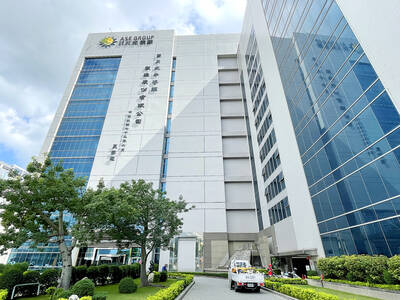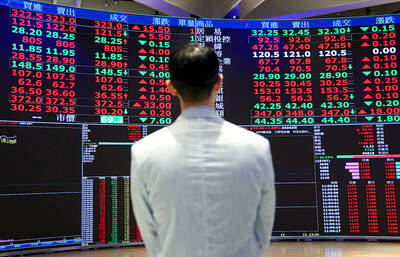Taipei City’s competitiveness as a financial center ranks 41st in the world, the latest Global Financial Centers Index published on Thursday said. Taipei is included in the ratings for the first time.
The index, which was launched in March 2007 by the Z/Yen Group for the City of London, is updated every six months.
This month’s edition — the fifth in the series — provides ratings for 62 major financial centers around the world, with three new entrants: Taipei, Kuala Lumpur and Bangkok.
The report says London, just ahead of New York, remains the world’s most competitive financial center. Rounding out the top 10 are Singapore, Hong Kong, Zurich, Geneva, Chicago, Frankfurt, Boston and Dublin.
Among major financial centers in East Asia, Tokyo ranks 15th, down eight notches from the previous index. Shanghai has dropped one place to 35th, Beijing is down four notches to 51st and Seoul has fallen five places to 53rd.
Stuart Fraser, chairman of the Policy and Resources Committee of the City of London, said the latest results reflect the severe loss of confidence across all financial centers in the wake of a series of events, such as the collapse of global financial services firm Lehman Brothers and the effective nationalization by the US government of the mortgage giants Fannie Mae and Freddie Mac.
However, Fraser noted that the top-ranked centers have shown a much greater degree of resilience and a smaller drop in scores than those further down the rankings, adding that this may reflect a greater confidence in the ability of long-established centers to weather the global economic crisis.

EXPANSION: The investment came as ASE in July told investors it would accelerate capacity growth to mitigate supply issues, and would boost spending by 16 percent ASE Technology Holding Co (ASE, 日月光投控), the world’s biggest chip assembly and testing service provider, yesterday said it is investing NT$17.6 billion (US$578.6 million) to build a new advanced chip packaging facility in Kaohsiung to cope with fast-growing demand from artificial intelligence (AI), high-performance-computing (HPC) and automotive applications. The new fab, called K18B, is to commence operation in the first quarter of 2028, offering chip-on-wafer-on-substrate (CoWoS) chip packaging and final testing services, ASE said in a statement. The fab is to create 2,000 new jobs upon its completion, ASE said. A wide spectrum of system-level chip packaging technologies would be available at

Taiwan’s foreign exchange reserves hit a record high at the end of last month, surpassing the US$600 billion mark for the first time, the central bank said yesterday. Last month, the country’s foreign exchange reserves rose US$5.51 billion from a month earlier to reach US$602.94 billion due to an increase in returns from the central bank’s portfolio management, the movement of other foreign currencies in the portfolio against the US dollar and the bank’s efforts to smooth the volatility of the New Taiwan dollar. Department of Foreign Exchange Director-General Eugene Tsai (蔡炯民)said a rate cut cycle launched by the US Federal Reserve

HEAVYWEIGHT: The TAIEX ended up 382.67 points, with about 280 of those points contributed by TSMC shares alone, which rose 2.56 percent to close at NT$1,400 Shares in Taiwan broke records at the end of yesterday’s session after contract chipmaker Taiwan Semiconductor Manufacturing Co (TSMC, 台積電) hit a fresh closing-high amid enthusiasm toward artificial intelligence (AI) development, dealers said. The TAIEX ended up 382.67 points, or 1.45 percent, at the day’s high of 26,761.06. Turnover totaled NT$463.09 billion (US$15.22 billion). “The local main board has repeatedly hit new closing highs in the past few sessions as investors continued to embrace high hopes about AI applications, taking cues from a strong showing in shares of US-based AI chip designer Nvidia Corp,” Hua Nan Securities Co (華南永昌證券) analyst Kevin Su

Nvidia Corp’s major server production partner Hon Hai Precision Industry Co (鴻海精密) reported 10.99 percent year-on-year growth in quarterly sales, signaling healthy demand for artificial intelligence (AI) infrastructure. Revenue totaled NT$2.06 trillion (US$67.72 billion) in the last quarter, in line with analysts’ projections, a company statement said. On a quarterly basis, revenue was up 14.47 percent. Hon Hai’s businesses cover four primary product segments: cloud and networking, smart consumer electronics, computing, and components and other products. Last quarter, “cloud and networking products delivered strong growth, components and other products demonstrated significant growth, while smart consumer electronics and computing products slightly declined,” compared with the